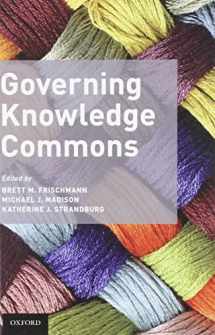
Governing Knowledge Commons
ISBN-13:
9780199972036
ISBN-10:
0199972036
Edition:
1
Author:
Katherine J. Strandburg, Brett M. Frischmann, Michael J. Madison
Publication date:
2014
Publisher:
Oxford University Press
Format:
Hardcover
520 pages
FREE US shipping
Book details
ISBN-13:
9780199972036
ISBN-10:
0199972036
Edition:
1
Author:
Katherine J. Strandburg, Brett M. Frischmann, Michael J. Madison
Publication date:
2014
Publisher:
Oxford University Press
Format:
Hardcover
520 pages
Summary
Governing Knowledge Commons (ISBN-13: 9780199972036 and ISBN-10: 0199972036), written by authors
Katherine J. Strandburg, Brett M. Frischmann, Michael J. Madison, was published by Oxford University Press in 2014.
With an overall rating of 3.7 stars, it's a notable title among other
Public
(Administrative Law, Environmental & Natural Resources Law, Intellectual Property) books. You can easily purchase or rent Governing Knowledge Commons (Hardcover) from BooksRun,
along with many other new and used
Public
books
and textbooks.
And, if you're looking to sell your copy, our current buyback offer is $0.32.
Description
"Knowledge commons" describes the institutionalized community governance of the sharing and, in some cases, creation, of information, science, knowledge, data, and other types of intellectual and cultural resources. It is the subject of enormous recent interest and enthusiasm with respect to policymaking about innovation, creative production, and intellectual property. Taking that enthusiasm as its starting point, Governing Knowledge Commons argues that policymaking should be based on evidence and a deeper understanding of what makes commons institutions work. It offers a systematic way to study knowledge commons, borrowing and building on Elinor Ostrom's Nobel Prize-winning research on natural resource commons. It proposes a framework for studying knowledge commons that is adapted to the unique attributes of knowledge and information, describing the framework in detail and explaining how to put it into context both with respect to commons research and with respect to innovation and information policy. Eleven detailed case studies apply and discuss the framework exploring knowledge commons across a wide variety of scientific and cultural domains.


We would LOVE it if you could help us and other readers by reviewing the book
Book review

Congratulations! We have received your book review.
{user}
{createdAt}
by {truncated_author}


